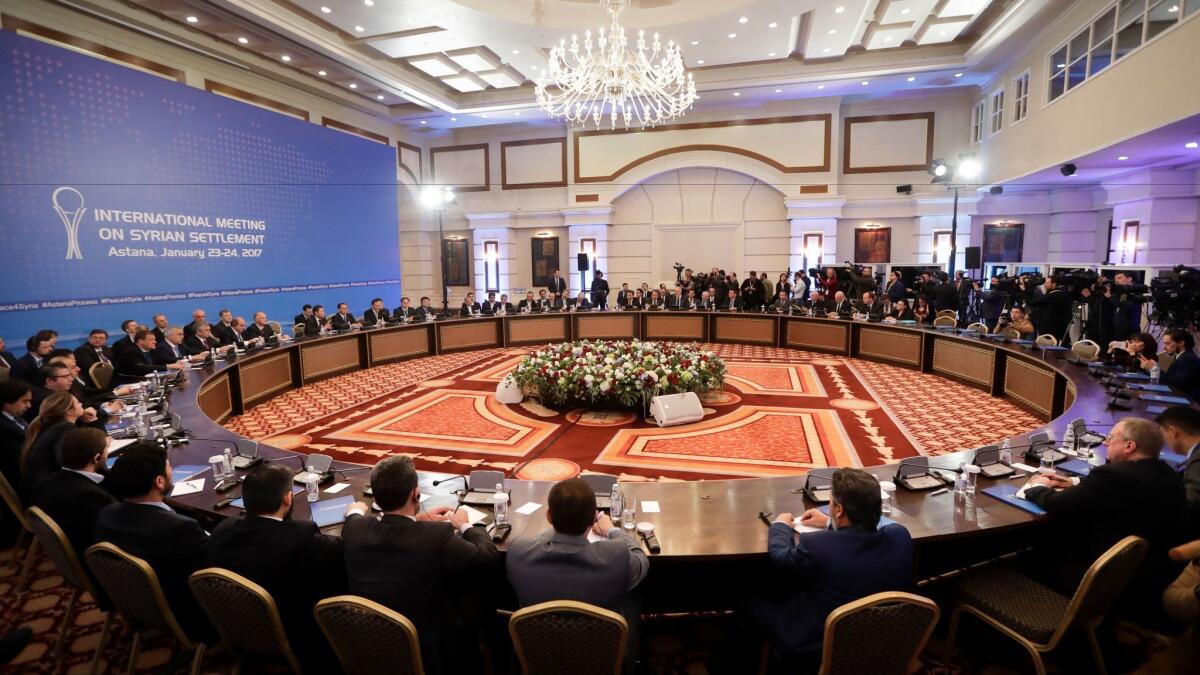The key to success in latest Syrian peace talks: low expectations

- Share via
Reporting from AMMAN, Jordan — It’s said that those who expect nothing will never be disappointed.
That would be a fitting mantra for the latest attempt to end six years of civil war in Syria, a peace conference brokered by Russia and Turkey in Kazakhstan’s capital, Astana.
The negotiations — the first time the Syrian government has met with an opposition delegation composed exclusively of rebel fighters — got off to a difficult start on Monday as the two sides angrily traded insults.
Calling the Syrian government a “bloody, oppressive regime,” Mohammed Alloush, the lead negotiator for the opposition and commander of the Islam Army rebel faction, said in a closed-session speech later uploaded to social media that any political solution would start with the departure of Syrian President Bashar Assad.
Syrians had been forced to choose between “the terrorism of Bashar and the terrorism of Daesh,” he said, using the Arabic acronym for Islamic State, which controls territory in both Syria and Iraq.
Bashar Jaafari, Syria’s ambassador to the U.N. and the government’s lead negotiator, struck back at a news conference, calling Alloush the head of the “armed terrorist groups’ delegation” and deriding his comments as “undiplomatic, irrelevant to the meeting and inappropriate,” according to a transcript provided by Syrian state news operator SANA.
“What happened today is somewhat surreal and ill-fitting of the monumental efforts that were exerted and doesn’t befit the level of the important delegations that attended the opening session,” he said.
Just getting both sides to the negotiating table was a small victory. Previous talks in Geneva that were brokered by the United Nations included political opposition figures who were dismissed by Syrian government officials as not having significant influence on the battlefield.
More than 400,000 have been killed and millions more displaced — engulfing Europe in a refugee crisis that has fed the rise of right-wing political movements there — since the civil war started in March 2011.
The negotiations Monday started with both delegations seated at opposite ends of a large conference table in the Rixos President Hotel. After an hourlong closed session, it quickly became clear that any high expectations needed to be dialed back.
The talks would not include direct negotiations and instead would aim solely at strengthening a tenuous cease-fire and improving the chances for success at a U.N. peace conference scheduled for next month in Geneva.
“We are not here for political negotiations,” Issam Rayess, a spokesman for the Western-backed Free Syrian Army, said in a news conference televised by the pro-opposition Orient News outlet. “We are all defected officers, and we are not here for a political transition. That is done by the High Negotiations Committee” — the main umbrella group of the opposition.
“We are just working on the military issues,” he said. “There are political figures and politicians who will focus on Geneva and the political solution.”
The cease-fire, which took effect last month, has been plagued by accusations of violations by both sides, as the government has been trying to oust rebels from the Wadi Barada, a strategically important area that supplies drinking water in the capital, Damascus.
Russia, Turkey and Iran would agree to set up a “trilateral mechanism” to monitor the cease-fire in Syria, the Russian state news agency Tass reported on Monday, citing a draft of the agreement they hope will emerge from the talks in Astana.
Those three countries would also join forces to fight two groups that are excluded from the cease-fire — Islamic State and a former Al Qaeda affiliate now known as the Front for the Conquest of Syria — without targeting so-called mainstream opposition forces, the draft reportedly said.
Previous cease-fires had foundered because the opposition continued to work with the Front for the Conquest of Syria, whose jihadists are considered to be some of the most effective antigovernment fighters.
Staffan de Mistura, the U.N. special envoy to Syria, told delegates at the conference that “consolidating a nationwide cease-fire is only the first step.”
“No sustainable, long-term solution to the conflict in Syria can be attained through only military means, but through a political process,” he said.
Absent from an active role in the proceedings was the United States, which received an eleventh-hour invitation to attend despite vigorous objections by Iran, another key player in the talks.
The U.S. State Department said Saturday that it was focused on the “immediate demands of the transition” of President Donald Trump. It sent George Krol, the U.S. ambassador to Kazakhstan, as an observer.
Bulos is a special correspondent.
MORE WORLD NEWS
With Trump in the White House, Israel moves aggressively to build on disputed land
Mexico’s president will be among the first foreign leaders to meet with Trump this month
Brazil investigates plane crash that killed judge overseeing massive ‘Car Wash’ corruption case
Gambian leader who once said only God could remove him cedes power under military pressure
UPDATES:
3:15 p.m.: This article was updated with political analysis and background on the Syrian civil war.
This article was originally published at 6:50 a.m.
More to Read
Sign up for Essential California
The most important California stories and recommendations in your inbox every morning.
You may occasionally receive promotional content from the Los Angeles Times.














